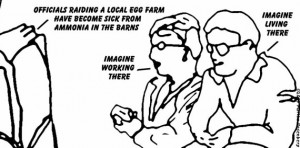How bad were conditions for 3 million laying hens at New England’s largest egg farm, Quality Egg of New England/Maine Contract Farming in Turner, Maine?
So bad that when Maine Department of Agriculture officials raided the factory farm on April 1, four Department workers themselves succumbed to the ammonia filled barns and had to be treated by doctors for burned lungs, missing work.
(No wonder Quality says its barns have “automatic feed and water systems” and “eggs are never touched by human hands.”)
So bad that OSHA is now investigating. (Where were they before?)
So bad that Philadelphia, PA-based Eggland’s Best dropped the farm’s largest franchisee Watertown, ME-based egg giant Radlo Foods which in turn dropped Quality Egg as of May 15 and pledged to go cage free.
Quality Egg, the former DeCoster Egg Farm, though the DeCoster family is still actively involved, has a thirty year history of animal, worker and environmental abuses.
In 1977 farm neighbors filed a $5 million lawsuit because their homes were infested with manure propagating insects.
In 1980, the Labor department charged the farm with employing five 11-year-olds and a 9-year-old.
In 1988 it let 100,000 chickens burn to death in a fire.
In 1996 it was presented with a fine for $3.6 million by the federal government for worker abuses. (Legal assistance lawyer Cesar Britos was overcome by barn ammonia too.)
And in 2001 a cruelty complaint was filed about dead hens intermingled with live ones during transport which the Department of Agriculture has not made public because it needs to be “reviewed and redacted.” (hello?)
But thanks to video from an undercover investigator for Mercy For Animals (MFA), agriculture and law enforcement officials raided Quality Egg for eight hours on April 1–with a search warrant and in the company of State Police troopers.
Like all battery cage operations, the 1,700-acre Quality Egg facility confines millions of hens in tiny cages in which they can’t walk, fully spread their wings or engage in other basic biological behaviors for over a year until they are rewarded with slaughter.
Quality’s seven 700-foot long barns with caged hens stacked on top of each other over manure pits produce 21 million eggs for such household names as Wal-Mart and grocery stores Stop & Shop, Shaw’s and Hannaford’s.
Video from the MFA investigator shows live hens left to hang by their feet over conveyer belts, left to suffocate in garbage cans and left to drown in manure pits which employees kicked them into.
Hens “lucky” enough to remain in their cages hover between life and death, their lungs infected and eyes plastered shut with keratoconjunctivitis lesions from living their whole lives in the ammonia fumes that sickened investigators in a few minutes.
“A hen’s head and wing were trapped under the cage’s front wall. One of her legs was stretched out and would not move or bend. She had a gash on her right side, leaving the skin split open and mostly yellow inside. A gash on her left side was red from fresh blood with a layer of dust partially covering the wound,” writes the investigator in his diary.
“Another live hen, also trapped under her cage’s front wall, had the side of her face on a moving egg belt. I saw that the side of her face, including her eye, was encrusted in what appeared to be egg yolk and dust.”
After the raid which was covered by the Associated Press, state and local officials, Quality’s customer/distributors and the grocery stores involved all professed ignorance of the conditions. Right.
Quality Egg Compliance Manager Bob Leclerc noted that Quality adheres to United Egg Producer guidelines — which permit battery cages — and said that none of the incidents were brought to “the attention of management before.”
Maybe he hadn’t yet watched the Mercy For Animals video which shows the investigator pointing out abuse — repeatedly — to other workers and supervisors including to Jay DeCoster, the son of Jack DeCoster. (An employee who was told there were live hens in trash cans he was emptying says, “It don’t matter.”)
A week after the raid — and before expected animal cruelty charges — Leclerc cleaned up the six feet deep manure piles and dying hens at Quality Egg and let the press in.
But it was a little late says Mercy For Animals executive director Nathan Runkle.
The egg industry tries to pretend it’s a few “bad employees” when it’s exposed says Runkle. But in reality the abuse videotaped depicts “standard handling and killing practices used on egg farms across the country. It is systemic, widespread and endemic to caged egg operations.”











